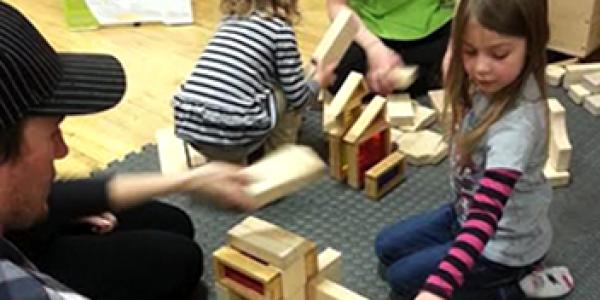Q&A: What the Research Tells us About Block Play and STEM Learning

Young children + families + interactive block building = future scientists, architects and engineers.
During a recent event at NAEYC celebrating the opening of the White House-sponsored Early Learning STEM Symposium, Patricia Kempthorne highlighted BLOCKFest, a research-based initiative designed to equip children ages 8 mo.-8 yrs. (and their families) with Science, Technology, Engineering and Math (STEM) skills through block play. Kempthorne is the mother behind the idea and the founder of The Twiga Foundation, which supports BLOCK Fest.
Read our interview with Patricia on the importance of block play and how families can support young children’s STEM learning at home.
What do children learn through block play?
Playing with blocks provides the opportunity for children to learn elements of science and math, like problem solving, counting, adding and subtracting, and helps them build both gross and fine motor skills. Block play also supports other key aspects of development, including language learning as children talk about the structures they built with the adults and children around them, creativity, imagination, self-esteem, and social and emotional growth.
How does it connect to STEM?
Block play provides a natural context for exploring the physical world. Like little scientists, children experiment with structures and observe the outcomes of their building efforts. Through this process they learn about mass, weight, proportionality and balance, and can use their new concepts to plan and predict outcomes.
Block play with an 18-month-old is different than block play for a five year old. What types of block play and blocks work well for different aged children and why?
Children go through various stages of block play. As they work through the learning of one stage they are ready to move on to the next stage of play. As skills advance, it is typical for children to combine several stages. The stages are developmental—each one building on the last—but children advance at their own rate regardless of their age.
- Stage 1: Discovering Blocks
- Stage 2: Stacking Blocks
- Stage 3: Complex Stacking
- Stage 4: Making Enclosures
- Stage 5: Creating Bridges or Arches
- Stage 6: Combining Enclosures and Bridges
- Stage 7: Building with Patterns and Symmetry
- Stage 8: Building Block Structures that Represent Objects for Pretend Play
What is BLOCK Fest?
BLOCK Fest is a research-based, family interactive event that uses five block play stations (of five different sized blocks) to introduce children and their parents, through guided play and conversation, to the foundational STEM value of blocks. Parents—and communities using the exhibit—learn about early math and science concepts and learn that, just as with early literacy, fluency in early math is a strong predictor for school readiness. BLOCK Fest events are conducted by a trained host to ensure they are an educational experience for parents, caregivers and children. The training provides the STEM research background and tools to facilitate parent and child engagement.
What do families learn about children's learning and development as they observe their children playing with blocks?
Parents and children form an emotional bond during block play. Block play has been shown to actually increase parent knowledge of early development in the areas of math and science education, while at the same time providing opportunities for young children to increase their math, science, social and literacy skills. Parents observe the following behaviors from their children during block play: focusing, taking turns, listening, sorting, problem solving, predicting, observing outcomes, making patterns, comparing, naming, counting, wondering and many forms of mathematizing.
What kinds of family interactions do you encourage and why?
BLOCK Fest was developed to provide an interactive block building experience for young children ages 8 months to 8 years and their parents. The family's role in block play includes making time and space for blocks at home, saving household materials for building, following the child’s lead, supporting their decision making and remembering to ask open-ended questions about the building process which invites children to talk about their understanding of the world around them.
Blocks provide opportunities for children’s social and emotional development as they build and share with others, and manage the frustration that comes when structures collapse. The characteristics of grit and perseverance are displayed and developed for both children and adults participating in active block play. In addition, children are challenged cognitively as they solve the problems that arise in the construction process.
What does the research tell us about the value of block play?
Two decades of research show that children build number and math skills from a very early age, and that those who are strong in early math skills excel in math in the later years. Research shows that children’s block play is related to later math competence and particular interest in STEM careers.
BLOCK Fest was developed and piloted by the University of Idaho Parents as Teachers program and is now produced and distributed by the Twiga Foundation, Inc. The Twiga Foundation and Parents as Teachers are working to expand the reach of these learning experiences in STEM education. To watch a video of BLOCK Fest in action, click here. To learn how to bring BLOCK Fest to your community and receive a parent handbook titled, Playing and Learning with Blocks, click here.
Susan Friedman is Senior Director, Publishing and Professional Learning at NAEYC.